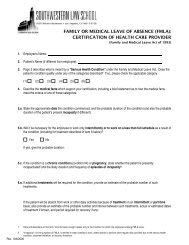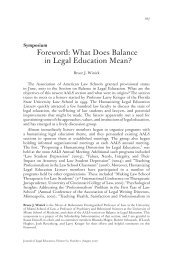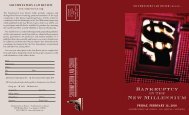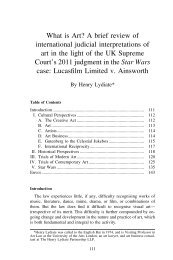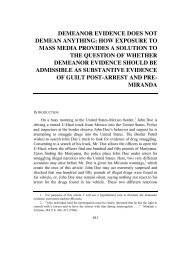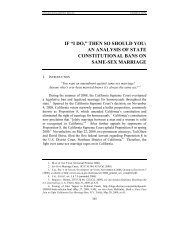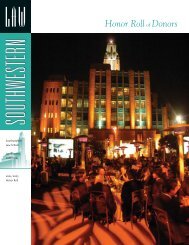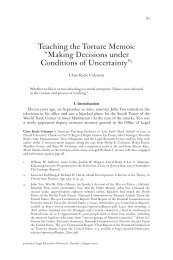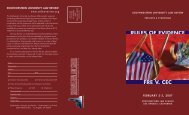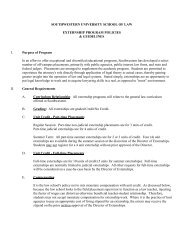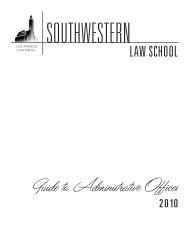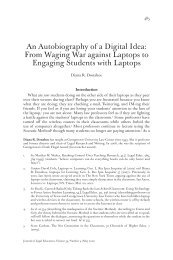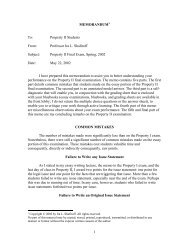Censoring the Censors in the WTO - Southwestern Law School
Censoring the Censors in the WTO - Southwestern Law School
Censoring the Censors in the WTO - Southwestern Law School
You also want an ePaper? Increase the reach of your titles
YUMPU automatically turns print PDFs into web optimized ePapers that Google loves.
34 J. Int’l Media & Enterta<strong>in</strong>ment <strong>Law</strong> Vol. 3, No. 1<br />
event after arriv<strong>in</strong>g <strong>in</strong> Ch<strong>in</strong>a for <strong>the</strong> concert—“I’m pleased that <strong>the</strong><br />
M<strong>in</strong>istry of Culture is protect<strong>in</strong>g <strong>the</strong> morals of <strong>the</strong> expat bankers and<br />
<strong>the</strong>ir girlfriends that are go<strong>in</strong>g to be com<strong>in</strong>g” 83 —raises <strong>the</strong> question<br />
of just what “public” <strong>the</strong> Ch<strong>in</strong>ese Government’s “prohibited content<br />
laws” are <strong>in</strong>tended to protect. That is, Jagger essentially was question<strong>in</strong>g<br />
whe<strong>the</strong>r <strong>the</strong> Government’s claim that <strong>the</strong> lyrics conta<strong>in</strong>ed <strong>in</strong> <strong>the</strong> five<br />
above-mentioned songs offend <strong>the</strong> Ch<strong>in</strong>ese people’s morals is credible,<br />
given that illegal copies of <strong>the</strong>se songs have circulated <strong>in</strong> Ch<strong>in</strong>a for<br />
years, <strong>the</strong> under-18 set <strong>in</strong> Ch<strong>in</strong>a today doesn’t even consider <strong>the</strong> Stones’<br />
music “hip enough” to warrant <strong>the</strong>ir patroniz<strong>in</strong>g <strong>the</strong> Stones’ concert,<br />
and <strong>the</strong> great majority of <strong>the</strong> people expected to attend <strong>the</strong> Stones’ concern<br />
were elderly, wealthy foreigners. 84<br />
If <strong>the</strong> U.S. were to directly challenge one of Ch<strong>in</strong>a’s prohibited content<br />
laws <strong>in</strong> <strong>the</strong> <strong>WTO</strong> and Ch<strong>in</strong>a, <strong>the</strong>n predictably were to raise a public<br />
morals defense to that challenge, <strong>the</strong> U.S. might argue that <strong>the</strong> prohibited<br />
content law <strong>in</strong> question doesn’t implicate any moral concern. It is much<br />
more likely, however, that <strong>the</strong> U.S. would concede that it is possible<br />
that <strong>the</strong> Ch<strong>in</strong>ese people f<strong>in</strong>d <strong>the</strong> prohibited content <strong>in</strong> question to be<br />
morally objectionable and argue that <strong>the</strong> Ch<strong>in</strong>ese Government cannot<br />
prove that a majority of <strong>the</strong> Ch<strong>in</strong>ese people object to <strong>the</strong> prohibited content<br />
on moral grounds. A number of Ch<strong>in</strong>a’s very broadly-stated prohibited<br />
content laws are particularly vulnerable to attack by ano<strong>the</strong>r <strong>WTO</strong><br />
member on this ground. Examples of such laws <strong>in</strong>clude prohibitions on<br />
<strong>the</strong> publication or dissem<strong>in</strong>ation of any <strong>in</strong>formation “that is prejudicial<br />
to public order,” 85 “that violates <strong>the</strong> Constitution or laws or <strong>the</strong> implementation<br />
of adm<strong>in</strong>istrative regulations,” 86 “that <strong>in</strong>cites <strong>the</strong> overthrow<br />
of <strong>the</strong> government or <strong>the</strong> socialist system,” 87 that <strong>in</strong>cites division of <strong>the</strong><br />
country,” 88 “that is harmful to national unity,” 89 “that destroys <strong>the</strong> order<br />
of society,” 90 “that <strong>in</strong>jures <strong>the</strong> reputation of state organs,” 91 “that opposes<br />
83. Kopp, supra note 80.<br />
84. Id.<br />
85. See, e.g., PRC Interim Regulations Govern<strong>in</strong>g <strong>the</strong> Management of International<br />
Computer Networks, Legal Daily, February 12, 1996, issued by State Council Order<br />
No. 195, signed by Premier Li Peng on February 1, 1996, Art. 13.<br />
86. See, e.g., Management Measures of <strong>the</strong> PRC Regulations for <strong>the</strong> Safety Protection<br />
of Computer Information Systems, <strong>in</strong> Jisuanji Ji Wangluo—Falu Fagui, Computer &<br />
Internet—<strong>Law</strong>s And Regulations 99, Art. 5 (Balu Chubanshje Beij<strong>in</strong>g 1999),<br />
87. Id.<br />
88. Id.<br />
89. Id.<br />
90. Id.<br />
91. Id.<br />
3058-088-3pass-02_Wright-r03.<strong>in</strong>dd 34<br />
6/30/2010 12:01:59 PM



